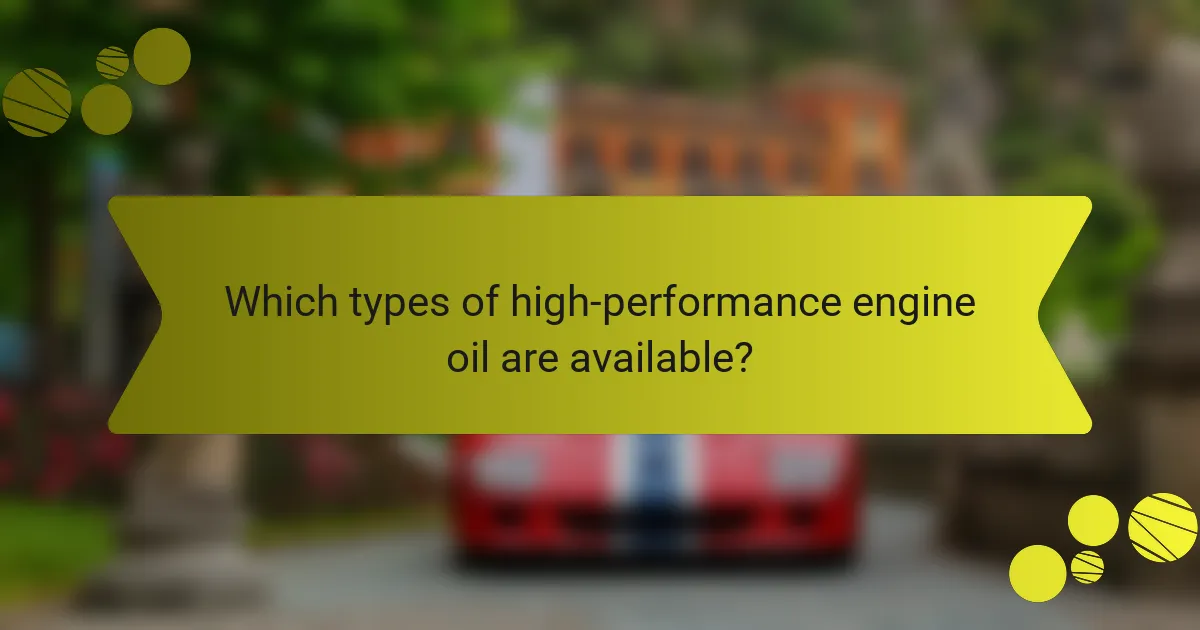High-performance engine oil significantly enhances vehicle performance by reducing friction and improving fuel efficiency. This article explores the benefits of high-performance oil, the various types available, and recommended brands known for superior protection and performance. Understanding these aspects is crucial for optimal engine longevity and efficiency.

What are the key benefits of high-performance engine oil?
High-performance engine oil offers enhanced protection, improved fuel efficiency, and better engine performance. It reduces wear, maintains optimal viscosity, and withstands extreme temperatures. These benefits extend engine life and ensure smooth operation under demanding conditions.
How does high-performance engine oil improve engine longevity?
High-performance engine oil significantly enhances engine longevity by reducing wear and tear. It maintains optimal viscosity, ensuring effective lubrication under extreme conditions. This oil also prevents sludge buildup, which can lead to engine failure. Additionally, it withstands high temperatures better than conventional oils, prolonging engine life.
Why is viscosity important in high-performance engine oil?
Viscosity is crucial in high-performance engine oil because it affects lubrication, engine efficiency, and temperature management. Optimal viscosity ensures a protective oil film, reducing friction and wear under extreme conditions. High-performance oils often have multi-viscosity ratings, allowing them to maintain effective lubrication across a range of temperatures, enhancing engine performance and longevity.
What role does high-performance engine oil play in fuel efficiency?
High-performance engine oil significantly enhances fuel efficiency by reducing friction and optimizing engine performance. This oil maintains stable viscosity across temperature ranges, ensuring proper lubrication. As a result, engines operate more efficiently, leading to improved fuel economy. Additionally, high-performance oils often contain advanced additives that clean engine components and reduce wear, further contributing to efficiency. Investing in quality engine oil can yield measurable improvements in fuel consumption.

Which types of high-performance engine oil are available?
High-performance engine oil is available in several types, including synthetic, semi-synthetic, and mineral oils. Synthetic oils offer superior performance and protection, while semi-synthetic oils provide a balance of cost and performance. Mineral oils are traditional options but may not perform as well under extreme conditions. Each type caters to specific engine requirements and driving conditions.
What are the differences between synthetic and conventional engine oils?
Synthetic engine oils offer superior performance and protection compared to conventional oils. They provide better lubrication, higher resistance to breakdown, and improved fuel efficiency. Synthetic oils typically contain fewer impurities and are engineered for specific performance characteristics. In contrast, conventional oils are derived from crude oil and may not perform as well under extreme conditions. Overall, synthetic oils are ideal for high-performance engines, while conventional oils are suitable for standard engines.
How do high-mileage engine oils differ from standard options?
High-mileage engine oils contain additives that address wear and tear in older engines, unlike standard oils. They often feature seal conditioners that help prevent leaks and reduce oil consumption. High-mileage oils typically have a higher viscosity, providing better protection for aging engine components. Additionally, these oils can enhance engine performance and longevity by reducing friction and improving lubrication.
Which additives enhance the performance of engine oil?
Additives that enhance engine oil performance include detergents, dispersants, anti-wear agents, and viscosity index improvers. These substances improve lubrication, reduce engine wear, and maintain oil stability under high temperatures. Detergents clean engine components, while dispersants keep contaminants suspended. Anti-wear agents protect metal surfaces, and viscosity index improvers ensure consistent performance across varying temperatures.

What are the most recommended brands of high-performance engine oil?
The most recommended brands of high-performance engine oil include Mobil 1, Castrol Edge, Royal Purple, Valvoline, and Amsoil. These brands are known for their superior lubrication, engine protection, and performance enhancement.
| Brand | Key Attribute | Unique Feature |
|—————-|——————————|—————————–|
| Mobil 1 | Advanced full synthetic | Trusted by many manufacturers |
| Castrol Edge | Fluid titanium technology | Adaptive to driving conditions |
| Royal Purple | High film strength | Enhanced wear protection |
| Valvoline | Synthetic blend | Superior cleaning agents |
| Amsoil | Extended drain intervals | Custom formulations |
Which brands are known for their premium synthetic oils?
Brands known for their premium synthetic oils include Mobil 1, Castrol Edge, Amsoil, Royal Purple, and Valvoline. These brands are recognized for high-performance formulations that enhance engine protection and efficiency.
What makes certain brands more popular in specific regions?
Certain brands of high-performance engine oil gain popularity in specific regions due to factors like local climate, vehicle preferences, and marketing strategies. For example, brands may tailor their products to meet the demands of colder climates or specific vehicle types prevalent in those areas. Regional partnerships and endorsements can also enhance brand visibility. Additionally, consumer trust in local distributors plays a significant role in brand preference.
How do user reviews influence brand selection for engine oil?
User reviews significantly influence brand selection for high-performance engine oil by providing insights into product effectiveness and reliability. Consumers often rely on these reviews to gauge performance attributes such as protection, viscosity, and fuel efficiency. Positive reviews can enhance brand reputation, while negative feedback can deter potential buyers. Brands with high ratings often showcase user testimonials to build trust, leading to increased sales.

What factors should be considered when choosing high-performance engine oil?
When choosing high-performance engine oil, consider viscosity, additive package, manufacturer specifications, temperature range, and intended use. These factors ensure optimal engine performance and longevity.
1. Viscosity: Select oil with the right viscosity grade for your engine’s requirements.
2. Additive Package: Look for oils with detergents, anti-wear agents, and friction modifiers for better protection.
3. Manufacturer Specifications: Follow OEM recommendations for oil standards to maintain warranty coverage.
4. Temperature Range: Choose oil that performs well in both high and low temperatures based on your climate.
5. Intended Use: Consider whether the oil is suitable for daily driving, racing, or heavy-duty applications.
How does climate affect the selection of engine oil?
Climate significantly influences engine oil selection by affecting its viscosity and performance. In colder climates, lower viscosity oils ensure better flow during startup, while hotter conditions require oils that maintain stability and protection at elevated temperatures. For example, a synthetic oil with a viscosity rating of 5W-30 performs well in varied temperatures, offering flexibility across seasons. Engine oils designed for high-performance vehicles often contain additives that enhance performance in extreme conditions, ensuring optimal engine function regardless of climate.
What specifications should be checked on oil containers?
Check the viscosity grade, API certification, container material, expiration date, and seal integrity on oil containers. Ensuring these specifications guarantees optimal performance and protection for high-performance engines.
Why is it important to follow manufacturer recommendations?
Following manufacturer recommendations is crucial for optimal engine performance and longevity. These guidelines ensure that high-performance engine oil meets specific viscosity and additive requirements tailored for your vehicle. Using the recommended oil type enhances engine efficiency, reduces wear, and improves fuel economy. Additionally, adhering to these recommendations helps maintain warranty coverage, protecting your investment. Ignoring them can lead to costly repairs and decreased performance over time.

How can high-performance engine oil impact vehicle performance?
High-performance engine oil significantly enhances vehicle performance by reducing friction, improving fuel efficiency, and providing better engine protection. It maintains optimal viscosity across temperature ranges, ensuring consistent lubrication. This leads to smoother engine operation and increased horsepower. Additionally, high-performance oils often contain additives that prevent sludge buildup and minimize wear, extending engine life.
What are the signs of using subpar engine oil?
Signs of using subpar engine oil include excessive engine noise, decreased fuel efficiency, and increased exhaust emissions. Additionally, you may notice oil sludge buildup or frequent oil changes required. High-performance engine oil prevents these issues by maintaining optimal viscosity and protecting engine components.
How often should high-performance engine oil be changed?
High-performance engine oil should be changed every 5,000 to 7,500 miles, depending on driving conditions. Frequent short trips, extreme temperatures, or heavy loads may necessitate more regular changes. Regular maintenance ensures optimal engine performance and longevity.
What are common mistakes when using high-performance engine oil?
Common mistakes when using high-performance engine oil include choosing the wrong viscosity, neglecting oil change intervals, and mixing different oil types. These errors can lead to suboptimal engine performance and increased wear. Always consult manufacturer guidelines for viscosity and change intervals to ensure optimal engine health.
What best practices should be followed for optimal engine oil performance?
To achieve optimal engine oil performance, follow these best practices: regularly check oil levels, use the recommended oil type for your vehicle, change oil at specified intervals, and monitor for leaks. Proper maintenance enhances engine longevity and efficiency.



